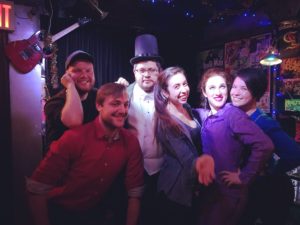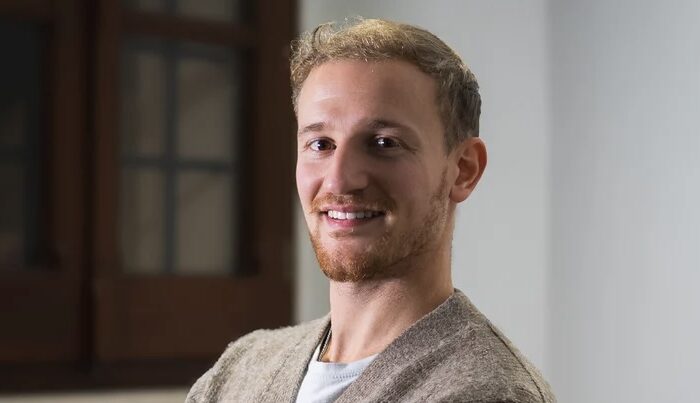
Q & A: Anne Hiatt Discusses How Opera On Tap Has Changed Audiences Perception of Opera
By Chris RuelClose your eyes music lovers and imagine going to a bar to hear a phenomenal cover band—a top-notch group of musicians who bring the hits alive and gets the joint jumping as the crowd quaffs some brews.
Now, imagine the group onstage isn’t covering Pearl Jam or The Rolling Stones, but Puccini and Rossini. You can stop imagining because there’s a company bringing the art form to the masses, meeting opera fans—and the opera curious—in the same venues where rock and jazz have lived for years.
Meet Opera on Tap, an organization that’s working to create a new generation of operagoers. Opera on Tap demystifies and removes from the equation the perceived snobbery and elitism associated with the art form, revealing to many that beneath the beautiful music, the world of opera is full of stories that can rival anything on television or in theaters today. Murder, sex, and dragons were things in opera long before “Game of Thrones,” but opera is intimidating—there’s no way around that except through education and exposure.
So, come on in, grab a bar stool and see a show where the ales and arias flow, where the vocal cords are cranked to 11 like Spinal Tap’s amplifiers, and Mozart and Miller mingle. OperaWire connected with Anne Hiatt, a member of Opera on Tap’s Board of Directors, to elaborate more on the company’s history, and performances.
OperaWire: What is Opera on Tap’s mission?
Anne Hiatt: Our organization is formed for educational purposes, including educating the public on culture and the arts and providing support and performance opportunities to young opera singers and classical instrumentalists. While our mission is to expose new audiences to opera and classical music by taking opera and classical music out of the concert hall and performing it in alternative venues, aid young performers in their development by giving them the opportunity to perform and to promote and support them through our organization, and to help promote new classical works of contemporary classical and operatic composers
OW: What was the impetus for starting Opera on Tap? When was the company founded?
AH: We were a group of young singers in between school and professional careers that were looking for opportunities to perform. I was at Freddy’s Bar in Brooklyn one night watching one of my voice student’s bands perform and lamented to the bartender how opera singers never have opportunities to just let their hair down and perform for the joy of it. He offered me a night at the bar and the rest is history. Our first show at Freddy’s was in 2005. We are now in 25 cities performing in bars across the US and Germany.
OW: What are some of the venues in which Opera on Tap performs?
AH: Here in NYC, we perform every month either at Freddy’s Bar or Barbès in Brooklyn. We’re also working on some midtown bar performance locations with our partners at Language Exchange NYC and can occasionally be found performing at Inwood Local. Outside of our bar shows, we can also be found producing full productions of new operas at such venerable venues as HERE and The Flea. We also can be found performing on the schoolyard at PS 129 in West Harlem where we have been piloting our in-school education program The Playground Operas with the third, fourth, and fifth-grade classes.
OW: Does Opera on Tap do complete shows or excerpt from various operas?
AH: At the bar, we tend to pick a theme for the evening where we can marry a diverse array of operatic and/or classical repertoire and present it concert-style. Performers are encouraged to interact with the audience and intro their arias and ensemble numbers to give newcomers a sense of character and story. Through our Playground Operas program and The Immersive Opera Project, we produce full original productions.
OW: What’s the ratio between standard repertoire and new opera?
AH: With our standard bar shows and with Playground Operas we focus more on standard rep. At Barbés where we present our New Brew salon series and with The Immersive Opera Project (our commissioning/development/full production program) we focus on new music. So, I would say the ratio is 50-50.
OW: What’s Opera on Tap’s commitment to early-career artists?
AH: Most of our performers tend to be at early stages of their careers. Opera on Tap provides a very large supportive network for performers as well as entrepreneurial artists through which we share performance opportunities and encourage everyone to share creative ideas across the country. We have had many instances where a performer with one Chapter moves to a new city and is immediately connected to that new city’s Chapter, thereby giving them an instant local network of artists.
OW: Are those in the audience who go to a venue and have no idea they’ll be hearing that night? How did they react?
AH: We have had that on occasion for sure, though for the most part, we work with venues that support promotion for our shows, so people tend to know we’re going to be there. I always like an early anecdote- when we were performing at the original Freddy’s location in the backroom- bar patrons had to pass through the back room to use the restrooms, so we surprised quite a few people that way and dare I say even made a few converts out of their necessity-based exposure to opera.
OW: Have you ever had someone come up to you and say, “I’m hooked!”
AH: Many times! We’ve had so many people tell us this. I think the intimacy of hearing opera up close is really impactful for many people.
OW: If you had three pieces of advice for those who are new to opera what would they be?
AH: First, remember you’re there to enjoy yourself. Second, opera comes in all sizes, shapes, and forms—explore your options. And, third, be pre-emptively curious. Read the synopses beforehand so you can sit back and just take the whole multi-sensory experience in.
OW: How can people find out about Opera on Tap performances?
AH: Visit our website at operaontap.org or come find one of our many chapters on Facebook and Instagram


